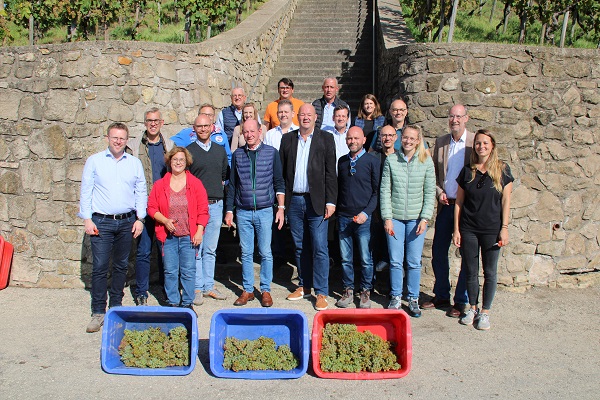 Group photo of harvest in Wormeldange vineyard, with Luxembourg's Minister of Agriculture, Viticulture and Rural Development, Claude Haagen (centre);
Credit: MA
Group photo of harvest in Wormeldange vineyard, with Luxembourg's Minister of Agriculture, Viticulture and Rural Development, Claude Haagen (centre);
Credit: MA
On Wednesday 27 September 2023, Luxembourg's Minister of Agriculture, Viticulture and Rural Development, Claude Haagen, visited the “Op der Koeppchen” vineyard in Wormeldange.
Together with representatives of the Professional Organisation of Independent Winegrowers ASBL (Organisation professionnelle des vignerons indépendants - OPVI), the Vinsmoselle Domains, the Luxembourg Federation of Wines and Spirits, and the Wine Institute (Institut viti-vinicole - IVV), Minister Haagen drew up an initial assessment of the harvest.
Although the year was marked by periods of extreme drought and heat, followed by heavy rainfall in the middle of the summer season, the winegrowers were nonetheless satisfied with the harvest. The heat accelerated the vines’ development and brought forward the start of the first crémant harvest to the week of 4 September, whereas in past years, the first bunches were harvested around the end of September.
This year, the winegrowers are working with the help of around 1,000 seasonal workers. The majority of them come from neighbouring countries and Eastern Europe, and seven jobseekers were also mobilised during a special Jobday organised by ADEM at the IVV.
According to the Luxembourg Ministry of Agriculture, Viticulture and Rural Development, the 2023 vintage promises to be fruity and refreshing, with lower alcohol contents than usual. The winegrowers expect a drop in quantity due to the laborious, manual qualitative sorting of the grapes for the production of wine and the making of Crémant de Luxembourg.
Minister Haagen congratulated the winegrowers: “I am proud to know that despite a laborious harvest, the 2023 vintage looks promising, and the first fruity 'Fiederwäissen' are already in the cellars! The grapes harvested manually for the production of Crémant de Luxembourg and personalised high-end wines are a guarantee of excellence and the good reputation of our cellars!”
The minister also praised the expertise of the IVV and its advisory role in favour of a resilient wine sector. The IVV has been testing the development of new grape varieties that are more resistant to diseases and environmentally friendly viticultural practices. Research projects in collaboration with the Luxembourg Institute of Science and Technology (LIST) and the Institut fir Biologesch Landwirtschaft an Agrarkultur Luxemburg (IBLA) aim to adapt wine production to climate change and make it more sustainable. Currently, almost half of the vineyard area is cultivated without the use of herbicides, the ministry noted.








